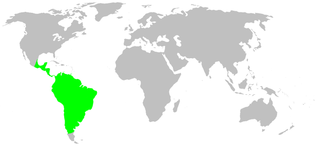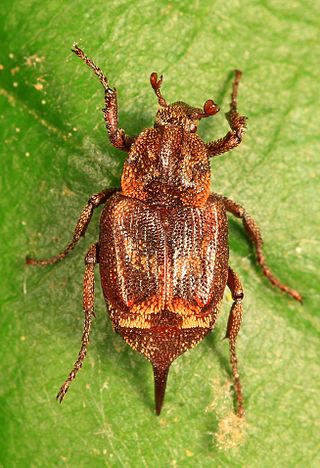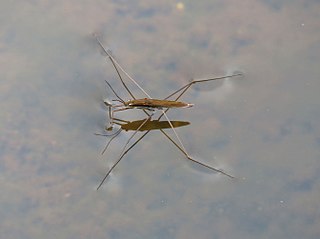
Valdosaurus is a genus of bipedal herbivorous iguanodont ornithopod dinosaur found on the Isle of Wight and elsewhere in England, Spain and possibly also Romania. It lived during the Early Cretaceous.

Busycotypus canaliculatus, commonly known as the channeled whelk, is a very large predatory sea snail, a marine prosobranch gastropod, a busycon whelk, belonging to the family Busyconidae.
Melicertus is a genus of "king" prawns, comprising eight species which were previously classified as members of the genus Penaeus:

Rabbitfishes or spinefoots, genus Siganus, are perciform fishes in the family Siganidae. It is the only extant genus in its family and has 29 species. In some now obsolete classifications, the species having prominent face stripes—colloquially called foxfaces–are in the genus Lo. Other species, such as the masked spinefoot, show a reduced form of the stripe pattern. Rabbitfishes are native to shallow waters in the Indo-Pacific, but S. luridus and S. rivulatus have become established in the eastern Mediterranean via Lessepsian migration. They are commercially important food fish, and can be used in the preparation of dishes such as bagoong.
Hemicoelus canaliculatus is a species of death-watch beetle in the family Ptinidae.

Elrhazosaurus is a genus of basal iguanodontian dinosaur, known from isolated bones found in Early Cretaceous rocks of Niger. These bones were initially thought to belong to a species of the related dryosaurid Valdosaurus, but have since been reclassified.

Senoculus is a genus of araneomorph spiders in the family Senoculidae, and was first described by Władysław Taczanowski in 1872. It is the only genus in the family Senoculidae.
Plaxhaplous was a genus of glyptodont, an extinct relative of the modern armadillo. It lived in the Pleistocene epoch. The type species is Plaxhaplous canaliculatus. Plaxhaplous canaliculatus fossils were found in Argentina, near Luján in Buenos Aires Province. Plaxhaplous fossils have also been found in Uruguay. and in the Charana Formation of Bolivia.

Bothrotes canaliculatus is a species of darkling beetle in the family Tenebrionidae.

Valgus canaliculatus is a species of scarab beetle in the family Scarabaeidae. It is found in North America.
Cremastocheilus canaliculatus is a species of scarab beetle in the family Scarabaeidae. It is found in North America.

Limnoporus is a genus of water striders in the family Gerridae. There are six extant described species in Limnoporus.
Dolichopus canaliculatus is a species of long-legged fly in the family Dolichopodidae.

Aquarius conformis is a species of water strider in the family Gerridae. It is found in eastern North America from Quebec west to Wisconsin and south to Florida and Mexico.

Limnoporus notabilis is a species of water strider in the family Gerridae. It is found in North America.
Conoplectus canaliculatus is a species of ant-loving beetle in the family Staphylinidae. It is found in North America.
Conoplectus is a genus of ant-loving beetles in the family Staphylinidae. There are about five described species in Conoplectus.
The four-toed worm lizard is a worm lizard species in the family Amphisbaenidae. It is endemic to Mexico.

Siganus canaliculatus, the white-spotted spinefoot, white-spotted rabbitfish, pearly spinefoot, seagrass rabbitfish, slimy spinefoot or smudgespot spinefoot is a species of marine ray-finned fish, a rabbitfish belonging to the family Siganidae. It is native to the western Pacific Ocean and Indian Ocean where it occurs on reefs and in lagoons.

Limnoporus rufoscutellatus is a species of pond skater in the family Gerridae described by Pierre André Latreille in 1807.











